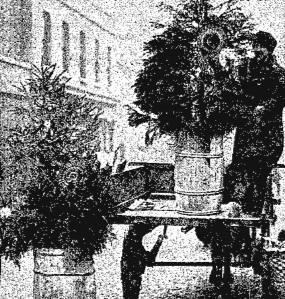Over 300 prisoners released to a stormy but peaceful Christmas
Northern Ireland PM voices hope for peace and goodwill in New Year
Creeslough, 27 December 1922 – Over 300 military prisoners were released from custody for Christmas after signing a pledge not to bear arms against the Free State government.
A list of 328 names of those released was issued by army headquarters, among them four female prisoners – Honor Murphy, Nellie Gleasure, May Nagle and Kathleen Barry.
The prisoners were greeted on their release with some of the most extreme weather that has been experienced in Ireland in over 20 years.
Gale force winds caused havoc to ships and trains. Disaster was only narrowly avoided on Christmas morning on the Burtonport section of the Derry and Lough Swilly Railway, when two coaches on the morning train were blown off the track at a point near Dunfanaghy road station. Mercifully, there were no fatalities, and the passengers were brought back to Creeslough where they spent the night.
For most Irish people Christmas Day involved church attendance but the unruly weather meant that many sought the sanctuary of the indoors after that. The weather may have also had a bearing in quelling the recent civil strife, as Christmas Eve and Christmas Day were notable, with few exceptions, for the silence of the guns.
Politics were to the fore in the Christmas message issued by the Prime Minister of Northern Ireland, Sir James Craig. ‘There were times during the past 12 months when the outlook was indeed gloomy, but if, as I hope, we have now emerged from under the shadows, it is in no small degree attributable to the spirit and courage of the people of Ulster themselves, and to the self-sacrifice of those who willingly came forward to defend their native land.’
Craig’s message continued with an expression of hope for peace and stability in 1923:
‘God grant that it may be a year of peace and goodwill, not only for Ulster but for the whole of Ireland, and that the system of government as it has now been established, north and south, will be given a fair trial, so that each government, within its own sphere, may be able to work in peace and security for the advancement of the highest interests of their people...’
[Editor's note: This is an article from Century Ireland, a fortnightly online newspaper, written from the perspective of a journalist 100 years ago, based on news reports of the time.]





















